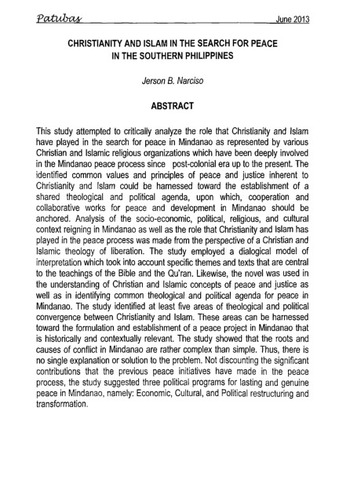Показать сокращенную информацию
A case study of the Christian education program of The Christian and Missionary Alliance among the Yakan Moslems in Basilan City
| dc.contributor.adviser | Griño, Eliza U. | |
| dc.contributor.author | Dapitan, Pilar Pacificar | |
| dc.date.accessioned | 2021-03-22T06:40:26Z | |
| dc.date.available | 2021-03-22T06:40:26Z | |
| dc.date.issued | 1971 | |
| dc.identifier.citation | Dapitan, P. P. (1971). A case study of the Christian education program of The Christian and Missionary Alliance among the Yakan Moslems in Basilan City (Unpublished Master's thesis). Central Philippine University, Jaro, Iloilo City. | en_US |
| dc.identifier.uri | https://hdl.handle.net/20.500.12852/636 | |
| dc.description | Abstract only | en_US |
| dc.description.abstract | This study was made to evaluate the Yakan Mission School in Basilan City as an agency of evangelization and as an instrument in the propagation of Christian influence in order to help determine whether or not the continued existence of the school could be justified. Although the study included research into the history and culture of the Yakans and the history of other evangelical Christian mission schools in the Philippines, the history and development of the school itself, including its problems and prospects, was the core of the study. The sources of information for this study were the school records of the Yakan Mission School, books containing pertinent related literature, interviews with living authoritative personages, personal visits to the Yakan Mission School and the Yakan community, observations of Yakan life, and conferences with the mission school personnel and leaders of The Christian and Missionary Allian Mission in the Philippines. The significant findings of the study based on a case study of the graduates of the school for 1961-1965 period are: 1. Out of the fifty-two Yakan graduates in the given period, the school effected twenty-six conversions to the Christian faith. Seventeen of these have remained in the faith. One of them is finishing his training for the Christian ministry. 2. The holding power of the school within the period, which was 67.7 per cent, is comparatively higher than the holding power of the elementary schools in one of the progressive divisions of the Bureau of Public Schools in the Philippines, whose holding power covering the same length of time, was 57.42 per cent. 3. The school seems to have effected marked changes in the attitudes of the graduates concerning certain social issues. This influence is especially shown in their attitudes toward higher education, their tribal marriage practices, and their attitude toward work. The school has also made a significant influence in their literacy. In the light of the findings of the study, the following recommendations are presented: A. In order that the Yakan Mission School could become more effective as an agency of evangelization: 1. The National Church of the Christian and Missionary Alliance in the Philippines should give it more attention and concern instead of simply delegating it to a lower church organization. 2. The school staff should be reinforced with an ordained Christian minister not only to take charge of the spiritual affairs of the school but also to extend its usefulness to the larger community. 3. The evangelistic campaigns should be extended to the community in order to expand the evangelistic ministry beyond the limits of the school. 4. Scholarships should be made available by the National Church of The Christian and Missionary Alliance in the Philippines to deserving converted graduates inclined either to teaching or to ministerial work with the view of using their services later. B. In order that the school could become more influential in other aspects of life in the Yakan community, its teachers should give more emphasis in their teaching to health and science subjects, especially to the importance of hygiene and sanitation. | en_US |
| dc.format.extent | x, 162 leaves | en_US |
| dc.language.iso | en | en_US |
| dc.subject.ddc | GSL Theses 378.242 D239 | en_US |
| dc.subject.lcsh | Christian education--Yakan (Philippine people) | en_US |
| dc.subject.lcsh | Christian influences | en_US |
| dc.subject.lcsh | Yakan (Philippine people)--Civilization | en_US |
| dc.title | A case study of the Christian education program of The Christian and Missionary Alliance among the Yakan Moslems in Basilan City | en_US |
| dc.type | Thesis | en_US |
| dc.description.bibliographicalreferences | Includes bibliographical references | en_US |
| dc.contributor.chair | Herradura, Elma S. | |
| dc.contributor.committeemember | Weely, Taylor D. | |
| dc.contributor.committeemember | Ruiz, Macario B. | |
| dc.contributor.committeemember | Tupaz, Loreto D. | |
| dc.contributor.committeemember | Griño, Eliza U. | |
| dc.contributor.committeemember | Espada, Wilfredo G. | |
| dc.contributor.committeemember | Alba, Seda G. | |
| dc.contributor.department | School of Graduate Studies | en_US |
| dc.description.degree | Master of Arts in Education | en_US |
| local.subject | Yakan Mission School | en_US |
| local.subject | Yakan Moslems | en_US |
| local.subject | The Christian and Missionary Alliance | en_US |
| local.subject | Yakan community | en_US |





